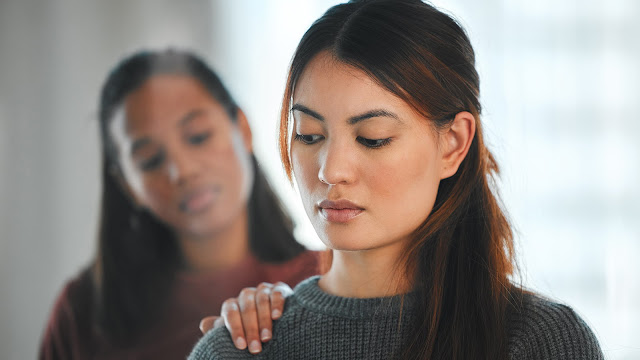Adults frequently experience sleep difficulties and problems, but statistics and research show that women are more prone than males to experience insomnia, which has an impact on both their physical and emotional health.
Women are substantially more likely than men to experience sleep issues, according to a recent American National Sleep Foundation poll.
Sleep disorders are brought on by a confluence of biological and psychological factors; some are common to most women while others are more age- or pregnancy- or breastfeeding-specific. Understanding these factors can help one deal with, resolve, or at the very least lessen sleep issues.
Periodic Changes
According to Fiona Baker, a professor and sleep expert from the United States who works at the University of the Witwatersrand in South Africa, menstruation-related hormonal changes, including mood swings, anxiety, and depression, as well as physical symptoms like cramps, bloating, and breast pain, can lead to sleep disorders in women.
According to Fiona, who spoke to The New York Times, progesterone levels fall in the days before menstruation, which increases the risk of sleep disorders. Additionally, some women may experience depressive pre-menstrual disorder, a more severe form of pre-menstrual syndrome.
Pregnancy
According to Shelby Harris, assistant professor of neuroscience and psychology at the Albert Einstein School of Medicine, pregnancy causes a variety of physiological and psychological changes in women, some of which are accompanied in the early months by symptoms like nausea, anxiety, and mood and hormonal changes. These changes all have a significant impact on how well women sleep.
Hormonal changes may cause women to sleep more soundly than usual during the first trimester of pregnancy, but by the third trimester, discomfort brought on by considerable bodily changes and the need to urinate more frequently increase sleep issues.
baby care
The difficulty in sleeping regularly does not end with the months of pregnancy; instead, it continues into the months that follow while the newborn baby is cared for.
Women's ability to unwind and go asleep can be badly impacted by their brains being constantly vigilant and prepared to act whenever their children scream, according to Harris.
Menopause
According to a study by the National Library of Medicine, up to 80% of women experience night sweats and hot flashes during the perimenopause period (which can last up to 4 years), and these symptoms can continue for several years after. These flashes have a negative impact on women in a number of ways, including their ability to sleep.
According to Baker, 20% of women experience frequent, severe hot flushes, which leads to the development of sleep difficulties.
Another study, also published by the National Library of Medicine, found that post-menopausal women are more likely to develop sleep apnea, a disorder that causes frequent nighttime awakenings and is brought on when the airway muscles relax and momentarily impede breathing.
Psychiatric conditions
Certain psychiatric problems, such as anxiety and depression, which have a major impact on sleep quality, are more likely to affect women than males.
A Gallup survey released in May found that twice as many women as males said they had depression.
According to data from the U.S. Department of Health and Human Services, women are twice as likely as males to have an anxiety disorder at some point in their life.
Physical Illnesses
The Polycystic Ovary Syndrome (PCOS), which causes hormonal imbalances that increase sleep crises and may also result in sleep apnea, is one health disease that affects women more often than it does men.
In addition, fibromyalgia, a condition that causes widespread muscle pain and disrupts sleep, affects women more than males.
Due to the various changes in the reproductive system that occur throughout menstruation, pregnancy, childbirth, and menopause, women are more likely than men to develop incontinence (up to twice as common), which causes sleep disruption because of the need to urinate frequently at night.
How do you get better sleep?
You can use some expert advice to improve your sleep quality and overcome sleep crises or at least mitigate their impact by:
Exercise:
Especially in the days before menstruation, it helps to feel another fatigue today and sleep more easily.
Pregnancy pillows:
Use pregnancy pillows that help reduce the impact of physical changes, especially during recent months. Christine Won, a sleep specialist at Yale University, recommends sleeping with a head lift to reduce pregnancy-related oesophageal reflux and snoring.
Alternative hormones:
Baker says that "hormone replacement therapy, which includes hormone supplements lost during the menopause, is the most effective way to treat heat flashes, but prefers to take the lowest dose for the shortest period of time", prescribed by the competent physician.
Avoid spices:
During menopause try to avoid spice-rich foods, which can increase heat flashes.
Cognitive behavioral therapy:
Harris says that "cognitive behavioral therapy (a psychotherapy method) is one of the best methods of treating insomnia, proven to be effective in improving sleep and relieving depressive symptoms."
General tips:
There are some general tips also to improve sleep quality; They include avoiding caffeine well before bedtime, sleeping and waking up on fixed appointments as much as possible, reducing the consideration of the phone an hour before bedtime, and trying to sleep in a cool, dark and quiet room.






Comments
Post a Comment